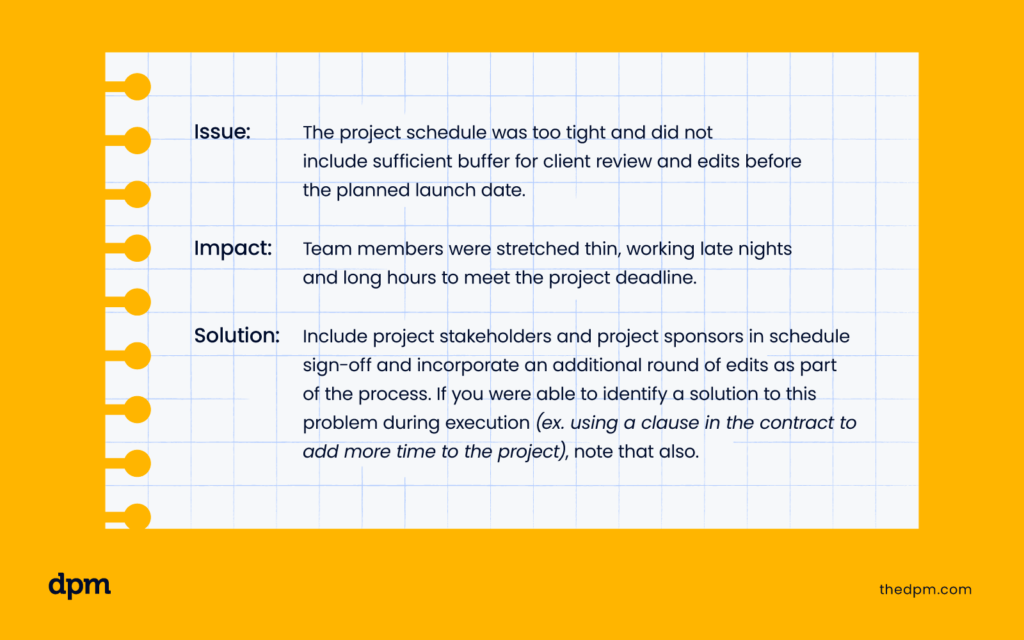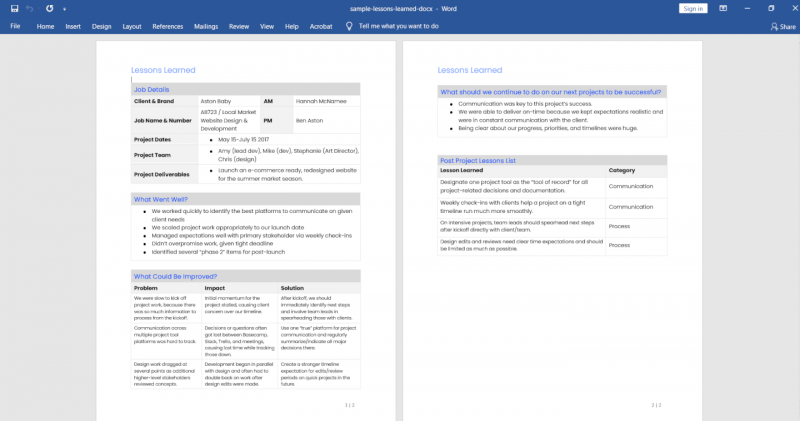Projects (especially the less than stellar ones!) can teach us many valuable lessons about how to manage teams and improve processes.
Organizations can analyze project failures to glean insights about how to streamline workflows, collaborate effectively across teams, and ultimately run future projects more efficiently.
But without a formalized system to track and apply those insights, it can be difficult to take advantage of lessons learned. A lessons learned template can help you document project learnings and implement these findings across your project portfolio.
What are Lessons Learned in Project Management?
A “lesson learned” in project management refers to knowledge that you gained in the course of project execution. This knowledge may benefit you on future projects. For example, you may have estimated that it would take your team two sprints to complete a deliverable, but it ended up taking them three sprints instead.
While lessons learned often have a negative connotation, they can also be positive. For example, you added 10% contingency to your budget to guard against unforeseen costs. You used the contingency to crash the schedule to recover from the underestimation and avoid a schedule delay. In this case, the lesson learned is a best practice to apply to future projects.
Reviewing lessons learned with your project team is similar to running a retrospective on an agile team. Capturing lessons learned is typically more in-depth, though, in that lessons learned are documented across the entire project and then consolidated in a shared repository. This may be true of your team retrospectives, but not necessarily.
What is a Lessons Learned Template?
A lessons learned template is a tool you can use to gather recommendations for improvement throughout the project life cycle. Using a standard format to gather these findings ensures that you don’t omit any critical information and promotes searchability when referencing these lessons learned across future engagements.
When to Use a Lessons Learned Template
In my experience, most project teams wait until the end of a project to collect feedback. Unfortunately, by that point, it’s often too late. You’ll likely struggle to recall those insights that were top of mind during the execution phase.
Instead, I’d recommend incorporating lessons learned into your project management processes throughout the project life cycle, not simply at project closure. On previous projects, I regularly reviewed lessons learned with my team for two reasons: 1) to record learnings while they were still fresh 2) to be able to apply any pertinent findings while the project was still ongoing.
These debriefs can be both educational and therapeutic—and typically result in a lot of usable data that’ll stop you making the same silly mistakes again!
4 Benefits of Lessons Learned Templates
Lessons learned templates offer several benefits:
- You and your team get the chance to learn and improve on observations you’ve already made on past projects. This data is not only useful to project planning but also process improvement and evaluation.
- Documenting your learnings means that you now have instant access to information that doesn’t have to be learned the hard way anymore. Recording lessons—which include successes—gives you and your team a roadmap to success on every project you work through in the future.
- Using a template prompts stakeholders to reflect on lessons learned that they may have otherwise missed using an unstructured collection mechanism.
- Codifying lessons learned in a template makes it easier for portfolio managers to consolidate and analyze lessons learned organization-wide.
How to Use a Lessons Learned Template
In this section, I’ll describe the elements to include as part of a lessons learned template, including project accomplishments, the rationale for suggested improvements, and a post project lessons list.
What went well?
It’s helpful to record accomplishments that may benefit future projects in your portfolio. Whether these include short-term process changes, a commitment to existing processes, communication tweaks, or something else, it’s worth documenting this to realize what can and should be carried on to the next project you work on as a team!
What could be improved?
Recording the reasons behind project issues or recommended improvements is also an important part of documenting lessons learned. Identifying a project issue isn’t enough—understanding where the issue originated and the impact it had gives more context to the issue and helps set up recommendations for making improvements moving forward.
It’s helpful to review project improvements by breaking down the problem, impact, and recommendation. Your team might have felt the impact of a problem before identifying the root cause—which is why it’s helpful to separate these items in your template.
Here’s an example:

- Issue: the project schedule was too tight and did not include sufficient buffer for client review and edits before the planned launch date
- Impact: team members were stretched thin, working late nights and long hours to meet the project deadline
- Solution: include project stakeholders and project sponsors in schedule sign-off and incorporate an additional round of edits as part of the process. If you were able to identify a solution to this problem during execution (ex. using a clause in the contract to add more time to the project), note that also.
Post project lessons list
After you and your team capture raw data on lessons learned, you may need to modify your inputs before adding them to your organization’s lessons learned database so they are universally applicable to future projects.
Our lessons learned template includes a section where you can list out the lessons learned post project. This lets you condense the insights you’ve gathered with your team into an action plan to apply to similar projects.
The most useful takeaways are clear and succinct (1-2 sentences long). They are to the point, actionable, and can be applied across projects. They should also specify what was learned, why this is relevant, and when to apply corrective action in the future.
For example:
- “Build at least 10% additional buffer into the project schedule to allow large stakeholder groups sufficient time to review work in progress”
- “Hold daily team check-ins over Slack to facilitate proactive communication and remove blockers efficiently.”
The template also asks you to identify which part of the project process or in what category this lesson belongs. Once you input the data into your lessons learned database, you can search by category to facilitate implementation on future projects.
More Articles
Looking for a Solid Lessons Learned Template?
The lessons learned template is available as a Microsoft Word document, and includes fields for project details like the project name, team members, and dates, as well as a framework for thinking through what could have been improved and space for recording lessons learned and any action items.

Career Builder members get access to this template, a filled-in sample, and lots more!
For more project management templates, become a member and view our entire template library here.
What Do You Think?
How frequently do you reflect on your experiences and projects? What was the most important lesson you learned in your career? Have you checked out our lessons learned template, and did you find it useful? Share with me in the comments!
If you’re looking to exchange lessons learned with other project managers, get practical insights and real-time community advice by becoming a DPM member. Join the collective. Find your people.


